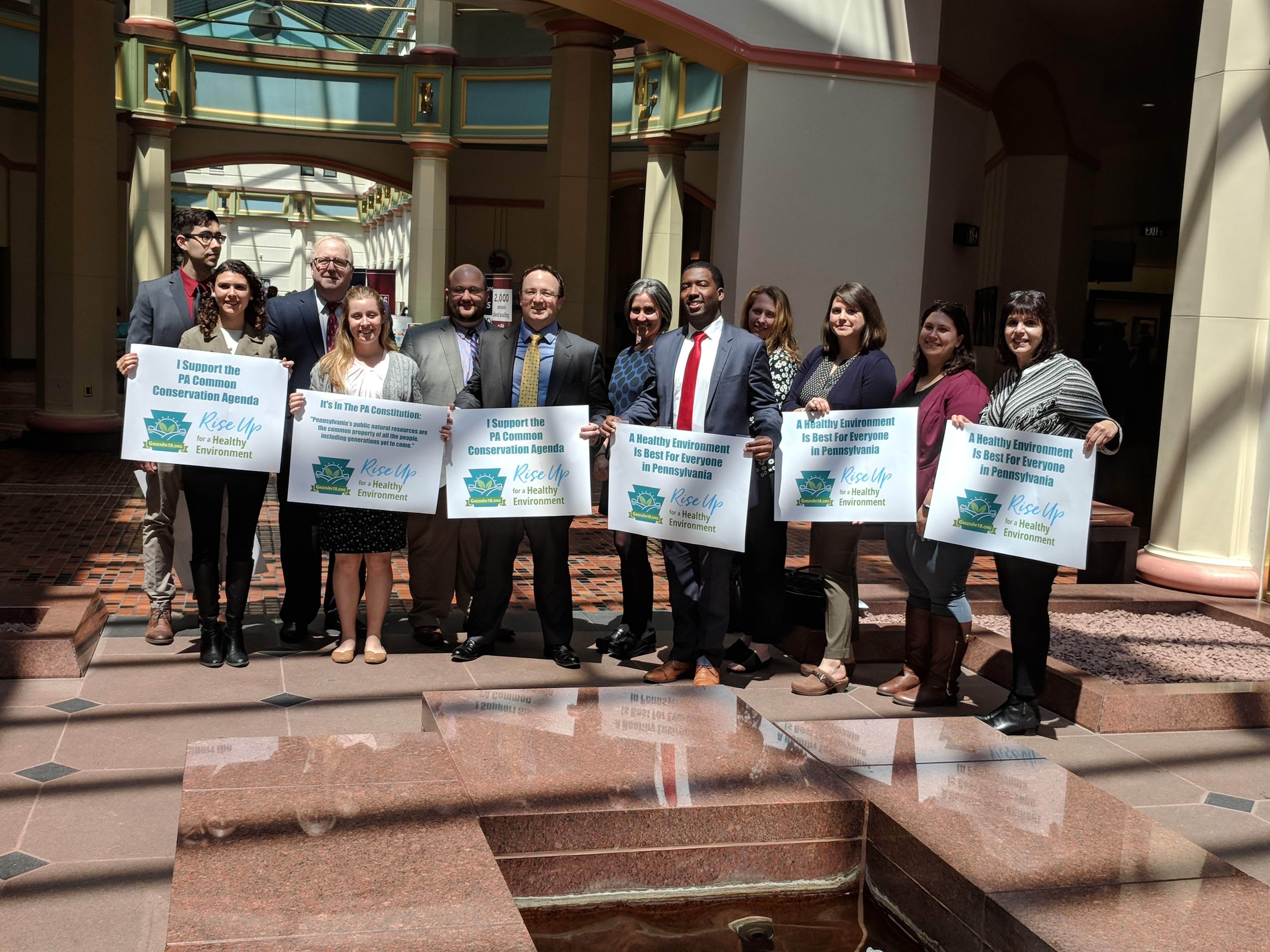A coalition of environmental organizations held a press conference at the capitol on May 1 to unveil the Pennsylvania Common Conservation Agenda.
Saleem Chapman, campaign manager for Green in ’18, explained that 25 organizations helped craft the agenda and said it is aimed at making environmental issues are a top priority for the candidates running to be Pennsylvania’s next governor. “For too long we have allowed ourselves to be divided by a false choice between a healthy environment and growing economy,” he stated. “Our speakers are here to put an end to that myth.”
Jacquelyn Bonomo, president and CEO of PennFuture, noted that Pennsylvania ranks second only to Alaska in the number of rivers and streams and emphasized the importance of clean water. “If we can protect, restore, and keep our waters clean, we can derive so many benefits. We ask the gubernatorial candidates to embrace the common agenda and the path it puts forward to cleaning water for all,” she stated. “One-fourth, nearly 20,000 of Pennsylvania’s 86,000 miles of rivers and streams in Pennsylvania are unsafe for drinking, recreation, aquatic life, or agricultural use. Today is the moment when renewed emphasis is needed for preserving the integrity of our waterways. Clean water is something that demands leadership from all candidates.”
Bonomo highlighted policy solutions in the Conservation Agenda, including the following:
- Proposed a legislative package to address lead in drinking water that includes the establishment of dedicated state funds for lead service line replacement;
- Direct the Public Utility Commission to instruct the state’s water utility companies to inventory lead service lines in their systems and develop a long-term plan for their placement;
- Identify appropriate funding to meet watershed restoration goals.
Myron Arnowitt, state director for Clean Water Action, called for the Department of Environmental Protection (DEP) and the Department of Conservation and Natural Resources (DCNR) to be fully funded. “We need to make sure that the next governor puts these agencies at the top of the list and are properly resourced,” he stated.
Arnowitt said the agenda also called for issuing methane rules that require significant emission reductions from both new and existing oil and gas sources. “This is something we can do right now that can have a positive impact on climate change. Pennsylvania emits one percent of greenhouse gases in the world and this is something that will protect Pennsylvanians against the harmful air pollution that comes from well and natural gas operations,” he stated. Arnowitt added that other policy considerations include an independent audit of pipeline permitting and enforcement processes carried out by DEP.

Veronica Coptis, executive director of the Center for Coalfield Justice, said the next governor should “integrate principles of environmental justice” throughout state government. “The state should be implementing environmental justice in every permitting decision and ensuring we are not creating more communities that are dealing with the risk of fossil fuel extraction,” she stated. “It’s also critical they establish an interagency working group with a focus on environmental justice; this group should promote integrated solutions for vulnerable communities through collaboration across traditional boundaries.”
Joanne Kilgour, chapter director for the Sierra Club, said the next governor should bolster the Commonwealth’s clean energy sector. “We are here today to proclaim our commitment to a future in which our environment, communities, and democracy are healthy and thriving,” she stated. “We are here today to ask that same commitment from our next governor, that he or she sees the vast possibilities of a Pennsylvania rooted in environmental rights, clean energy, and a healthy and diverse green economy,”
Nicole Faraguna, director of outreach and education for the Pennsylvania Land Trust Association, explained that Grower Greener investments have strengthened Pennsylvania’s economy while improving the lives of Pennsylvanians by addressing serious environmental concerns that could have be resolved through regulation alone. “Growing Greener has restored more than 1,600 acres of abandoned mines and improved the health and stability of miles of damaged waterways. It has protected more than 33,700 acres of family farmland and conserved more than 42,300 acres of family farmland and concerned more than 42,300 acres of threatened open space,” she stated. “We are asking the current and future leadership of this state to recognize the community, economic, health, and environmental benefits of these investments and to work on behalf of all Pennsylvanians to grow Pennsylvania greener.”

